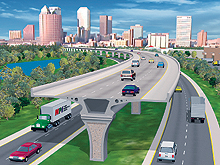
honolulutraffic.com
seeking cost-effective ways to reduce traffic congestion in Honolulu
The ongoing war against the automobile:
Some time ago we reprinted an excerpt from the 1974 book, War against the automobile, in which the author dealt with all the enemies of the automobile and why. Here's the excerpt: READ MORE
Then Professor James Dunn of Rutgers wrote a 1988 book titled Driving Forces, published by the Brookings Institution, the first chapter of which deals with the current enemies of the automobile. This chapter is fortunately available to us online and is must reading. READ MORE
Professor Dunn has also written a recent essay, Mobility Contested: Ethical Challenges for Planners, Administrators and Policy Analysts. This is also essential reading. He discusses the pervasive influence of what he calls "the anti-auto vanguard." Quote:
"This vanguard of enemies of the automobile rejects the conventional idea that the automobile-highway system is a hugely successful means of personal mobility with serious but manageable negative side effects. Rather, it sees the auto as an out-of-control cancer on the planet whose very existence now amounts to an "evil" which must be severely restricted. The vanguard sees it as their moral duty to implement as much of their anti-auto agenda as they can. In the U.S., the cutting edge of anti-auto thinking is found among environmentalists, social critics, urban planners, and proponents of public transportation.
In a democracy, the dilemma is how to reconcile the strong desire hundreds of millions of citizen/motorists have for the individual empowerment that cars provide with a small but intense and very active minority's strongly-held belief that, for the common good, people need to be discouraged, even prevented, from choosing auto-mobility."
Subsequently he discusses planning bias among this vanguard. Quote:
"In recommending a choice among public investments in transportation projects ranging from a highway improvement to a rail transit system, do the anti-auto beliefs make planners more likely to overestimate the number of future transit riders and underestimate the costs of constructing the transit system? A substantial amount of evidence has accumulated that this kind of pro-rail project error is widespread in transportation project planning. Is there an ethical transgression that must be ascribed to public employees who participate in a process which deliberately overstates the benefits and underestimates the costs of transportation choices? Is this persistent skewing of data in planning studies simply bureaucratic politics as usual or does it constitute a rather specific type of ethical lapse provoked and legitimized by the moral certitude inherent in the anti-auto vanguard position?"
Later, he describes how Dr.
Don Pickrell, now senior economist at USDOT's Volpe Center, was removed from any
transit responsibilities after he examined "the
political and bureaucratic factors that he believed may have led to the
systematic overestimation of ridership and underestimation of costs. He
suggested that local elected officials get committed to a project and
communicate this commitment to their planning staffs. The planners, in turn,
produce favorable numbers in order to have a better chance to compete for
limited federal subsidy dollars. They organize public hearings and public
relations campaigns in which pro-transit groups and anti-auto groups are
mobilized to show public demand for the projects. If federal officials are still
skeptical, local leaders can often rely on their congressional delegation's
political influence to legislatively "earmark" the funds for the new projects.
It is a process in which mayors, planning staffs, transit officials, transit
unions, and construction firms essentially conspired to have the federal
government finance their "Desire Named Streetcar." READ MORE
EDITOR: We just wanted you all to know that Honolulu is not alone in all this.